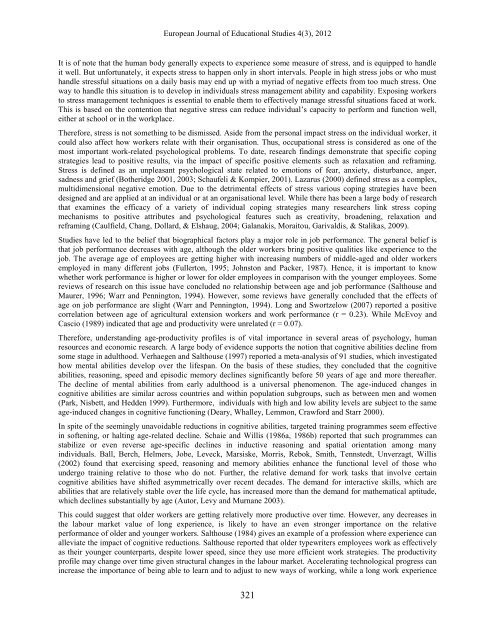Volume 4 Issue 3 (October 2012) - Ozean Publications
Volume 4 Issue 3 (October 2012) - Ozean Publications
Volume 4 Issue 3 (October 2012) - Ozean Publications
You also want an ePaper? Increase the reach of your titles
YUMPU automatically turns print PDFs into web optimized ePapers that Google loves.
European Journal of Educational Studies 4(3), <strong>2012</strong><br />
It is of note that the human body generally expects to experience some measure of stress, and is equipped to handle<br />
it well. But unfortunately, it expects stress to happen only in short intervals. People in high stress jobs or who must<br />
handle stressful situations on a daily basis may end up with a myriad of negative effects from too much stress. One<br />
way to handle this situation is to develop in individuals stress management ability and capability. Exposing workers<br />
to stress management techniques is essential to enable them to effectively manage stressful situations faced at work.<br />
This is based on the contention that negative stress can reduce individual‟s capacity to perform and function well,<br />
either at school or in the workplace.<br />
Therefore, stress is not something to be dismissed. Aside from the personal impact stress on the individual worker, it<br />
could also affect how workers relate with their organisation. Thus, occupational stress is considered as one of the<br />
most important work-related psychological problems. To date, research findings demonstrate that specific coping<br />
strategies lead to positive results, via the impact of specific positive elements such as relaxation and reframing.<br />
Stress is defined as an unpleasant psychological state related to emotions of fear, anxiety, disturbance, anger,<br />
sadness and grief (Botheridge 2001, 2003; Schaufeli & Kompier, 2001). Lazarus (2000) defined stress as a complex,<br />
multidimensional negative emotion. Due to the detrimental effects of stress various coping strategies have been<br />
designed and are applied at an individual or at an organisational level. While there has been a large body of research<br />
that examines the efficacy of a variety of individual coping strategies many researchers link stress coping<br />
mechanisms to positive attributes and psychological features such as creativity, broadening, relaxation and<br />
reframing (Caulfield, Chang, Dollard, & Elshaug, 2004; Galanakis, Moraitou, Garivaldis, & Stalikas, 2009).<br />
Studies have led to the belief that biographical factors play a major role in job performance. The general belief is<br />
that job performance decreases with age, although the older workers bring positive qualities like experience to the<br />
job. The average age of employees are getting higher with increasing numbers of middle-aged and older workers<br />
employed in many different jobs (Fullerton, 1995; Johnston and Packer, 1987). Hence, it is important to know<br />
whether work performance is higher or lower for older employees in comparison with the younger employees. Some<br />
reviews of research on this issue have concluded no relationship between age and job performance (Salthouse and<br />
Maurer, 1996; Warr and Pennington, 1994). However, some reviews have generally concluded that the effects of<br />
age on job performance are slight (Warr and Pennington, 1994). Long and Swortzelow (2007) reported a positive<br />
correlation between age of agricultural extension workers and work performance (r = 0.23). While McEvoy and<br />
Cascio (1989) indicated that age and productivity were unrelated (r = 0.07).<br />
Therefore, understanding age-productivity profiles is of vital importance in several areas of psychology, human<br />
resources and economic research. A large body of evidence supports the notion that cognitive abilities decline from<br />
some stage in adulthood. Verhaegen and Salthouse (1997) reported a meta-analysis of 91 studies, which investigated<br />
how mental abilities develop over the lifespan. On the basis of these studies, they concluded that the cognitive<br />
abilities, reasoning, speed and episodic memory declines significantly before 50 years of age and more thereafter.<br />
The decline of mental abilities from early adulthood is a universal phenomenon. The age-induced changes in<br />
cognitive abilities are similar across countries and within population subgroups, such as between men and women<br />
(Park, Nisbett, and Hedden 1999). Furthermore, individuals with high and low ability levels are subject to the same<br />
age-induced changes in cognitive functioning (Deary, Whalley, Lemmon, Crawford and Starr 2000).<br />
In spite of the seemingly unavoidable reductions in cognitive abilities, targeted training programmes seem effective<br />
in softening, or halting age-related decline. Schaie and Willis (1986a, 1986b) reported that such programmes can<br />
stabilize or even reverse age-specific declines in inductive reasoning and spatial orientation among many<br />
individuals. Ball, Berch, Helmers, Jobe, Leveck, Marsiske, Morris, Rebok, Smith, Tennstedt, Unverzagt, Willis<br />
(2002) found that exercising speed, reasoning and memory abilities enhance the functional level of those who<br />
undergo training relative to those who do not. Further, the relative demand for work tasks that involve certain<br />
cognitive abilities have shifted asymmetrically over recent decades. The demand for interactive skills, which are<br />
abilities that are relatively stable over the life cycle, has increased more than the demand for mathematical aptitude,<br />
which declines substantially by age (Autor, Levy and Murnane 2003).<br />
This could suggest that older workers are getting relatively more productive over time. However, any decreases in<br />
the labour market value of long experience, is likely to have an even stronger importance on the relative<br />
performance of older and younger workers. Salthouse (1984) gives an example of a profession where experience can<br />
alleviate the impact of cognitive reductions. Salthouse reported that older typewriters employees work as effectively<br />
as their younger counterparts, despite lower speed, since they use more efficient work strategies. The productivity<br />
profile may change over time given structural changes in the labour market. Accelerating technological progress can<br />
increase the importance of being able to learn and to adjust to new ways of working, while a long work experience<br />
321

















